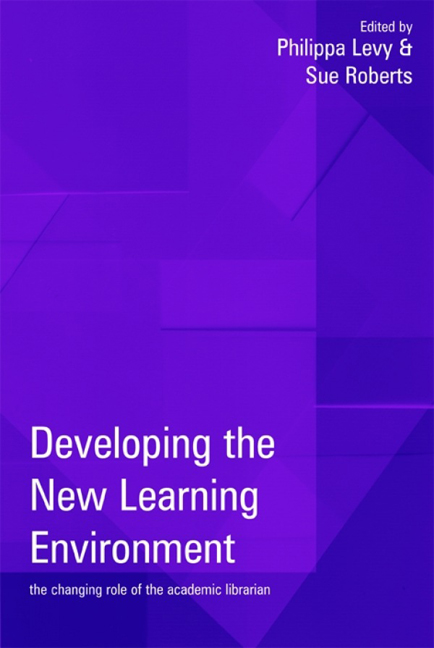Book contents
- Frontmatter
- Contents
- The editors and contributors
- Introduction: the challenge for the academic librarian
- Part 1 Perspectives on the policy framework
- Part 2 Policy into practice
- 6 New academic teams
- 7 Responding to the e-learning imperative
- 8 Information literacy education in practice
- 9 The inclusion agenda and its impact on practice
- 10 A kaleidoscope of change: how library management can support the development of new learning environments
- Part 3 Reflections
- Index
7 - Responding to the e-learning imperative
from Part 2 - Policy into practice
Published online by Cambridge University Press: 08 June 2018
- Frontmatter
- Contents
- The editors and contributors
- Introduction: the challenge for the academic librarian
- Part 1 Perspectives on the policy framework
- Part 2 Policy into practice
- 6 New academic teams
- 7 Responding to the e-learning imperative
- 8 Information literacy education in practice
- 9 The inclusion agenda and its impact on practice
- 10 A kaleidoscope of change: how library management can support the development of new learning environments
- Part 3 Reflections
- Index
Summary
Susannah Quinsee writes from the perspective of a relatively new role in higher education – that of the head of an e-learning unit. As indicated in our introduction, such units and teams have been developing rapidly across higher education. This chapter builds on Allison Littlejohn's overview of emerging learning technologies by focusing on new and existing roles in this context. An in-depth case study explores e-learning strategy implementation and the change process at City University, London. It provides an interesting perspective on the roles of the academic and learner support professional in a specific institution, advocating proactive ownership of professional roles and futures. The academic librarian is not the predominant focus of this chapter; rather, it explores in more detail other emerging and changing roles that are shaping the learning environment, causing us to reflect on how these are impacting on the longer-established library profession.
What is the ‘e-learning imperative’?
Allison Littlejohn's chapter (Chapter 4) indicates how important e-learning is for HEIs and, more specifically, the key role that library and information professionals can play in responding to this imperative. She also outlines how e-learning demands a reconceptualization of roles for all staff, with new workflows and approaches to managing and delivering student learning. This chapter will describe the experience of one institution in attempting to redefine and create staff roles in order to realize the potential of e-learning. The view advocated here is that e-learning inevitably brings transformation but that this can encourage us to rethink positively the very essence of our teaching and learning activities rather than force us to adopt alien systems and ways of thinking.
One of the key issues explored here is that any such redefinition or reevaluation of roles cannot be done in isolation. While this redefinition of roles may appear to conform with the rather controversial notions of the ‘industrial university’ (Oliver, 2003), it can also be regarded as a means by which we take a ‘back to basics’ approach and attempt collectively to define individual responsibilities. Before looking at this redefinition in more detail, a brief summary will be given of how e-learning can impact on a key set of staff roles – the academic, the administrator, the librarian/information professional and the technician.
- Type
- Chapter
- Information
- Developing the New Learning EnvironmentThe changing role of the academic librarian, pp. 133 - 152Publisher: FacetPrint publication year: 2005



